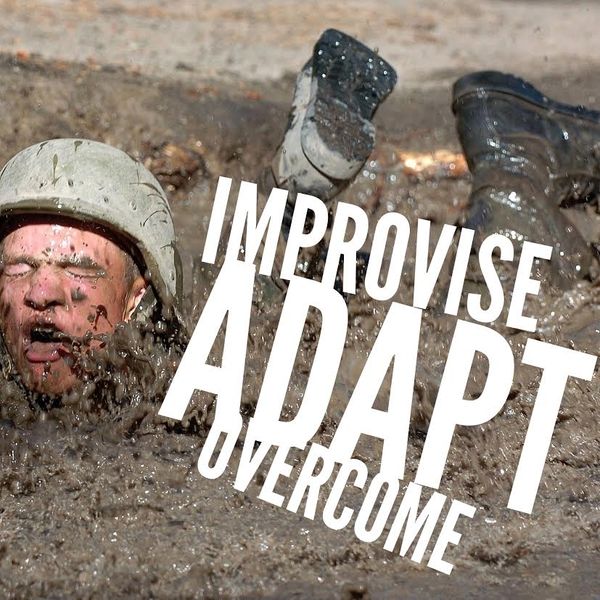My Top 3 Most Painful Language-Learning Problems and How I Solved Them

When my sister and I were growing up, our dad would quote this see image to us at times of struggle. Truth be told, we didn’t used to take it very seriously (sorry, Dad!) and would often tease him about it. However, as I got older the value of these words became more and more obvious to me.
As you know, learning a language is not easy. It's a very, very long journey (think: the Great Wall of China), with heaps of obstacles to overcome and extended periods of incredibly slow progress and hill-climbing pain. Using my dad's quote, I found my own way to get through some of these challenges whilst I was learning Spanish and Mandarin. Maybe they can help you too!
PROBLEM 1: Learning vocabulary is so interminably BORING (I think I might actually die…)
IMPROVISE, ADAPT, OVERCOME: Find a way to make vocab learning FUN (yes, it is possible!)
When I was learning Mandarin at university, my best friend and I would head straight to Starbucks after class each day and spend the next hour making up silly rhymes and stories to help us remember how to write certain characters. You’d be amazed to hear how far-fetched some of these stories got. Yes, I admit it, most of my student loan debt can be attributed to the daily lattés, but we had heaps of fun and actually went to class the next day knowing most of the characters. It was amazingly helpful and I actually enjoyed the process.

The left part of the character means “eye” and the right part of the character means “hair”. Poor eyesight is a problem when my fringe (AmE: bangs) gets too long because my hair is in front of my eyes. Giggle.
Tips:
- Find a friend to share some vocab-learning silliness with (more people = more silly ideas)
- Give yourself rewards or incentives that are unrelated to the actual task (Starbucks latté)
- Play! I’m a language junkie so making up silly rhymes and stories with weird (sometimes rude) words made it fun for me. If that’s not your thing, there are some great flashcard apps out there that use games and points and scores to help keep you motivated. Take advantage of whatever game floats your boat and turn it into a vocab-learning exercise.
Once you’ve found your own way of making this fun, you’ll learn hundreds of words in no time.
PROBLEM 2: I can’t understand people when they don’t speak exactly like the classroom CD
IMPROVISE, ADAPT, OVERCOME Expose yourself (no, I don’t mean take your clothes off!)
In 2013 I went to live in Granada, Andalucía, a beautiful old city in southern Spain. I’d studied years of Spanish and was really confident about my speaking and listening skills. On my first afternoon there, I met a woman who had lived in Granada all her life. She asked my name and I asked hers. And that’s where the conversation ended. The next sentence sounded something like “gdsjsdjk sjsdhsk sjssn sqoksm?” to me. Sirens sounded and police cars, ambulances and fire engines were all charging down the road inside my brain and I was thinking, “How can I have studied Spanish for so long and not understand a single word this woman is saying?!”
After a few weeks of avoiding the local frutería (fruit and veg shop) as I couldn’t understand the guy who worked there, and hours spent laughing with my friend and trying (and failing) to imitate the Andalusian accent, I gradually got accustomed to the sloppy speaking and copious palabrotas (“bad” words), slang and idioms of Andalucía. I now find myself loving the southern Spanish way of speaking and the friend I made that first day now calls herself my “Spanish sister.”
Tips:
- Find some good resources. You don’t have to travel - choose a respectable character on a TV series you enjoy who is roughly the same age and sex as you and pay attention to the way they speak and communicate in the language you’re learning.
- Practice what I call ‘active listening’. Forget worrying about the meaning of what the person is saying. Listen instead to the way they speak - the intonation of their voice, the sentence length, how loud or soft they speak, the way they use grammar and the phrases they come out with. Notice how this is different from the way people speak in your own language.
- Don’t take it too seriously - be sure to ask plenty of silly questions and be ready to laugh at yourself.
You’ll be surprised how quickly your brain starts recognising accents and other ways of communicating once it gets some exposure.
PROBLEM 3: I feel like I’ve studied for YEARS but I’m just not getting any better
IMPROVISE, ADAPT, OVERCOME: Notice what you don’t know
During my years teaching on Verbling I’ve had the privilege of meeting some pretty amazing language-learners. One in particular taught me a very valuable lesson. She was working as an English teacher and her English was already advanced when she first came to me, but she needed a near-native level of English and she had figured out a brilliant way of getting there. She would carry a notebook around with her everywhere and any time she didn’t know or wasn’t confident about something she said, she wrote it down. Then she brought her notebook to the class and asked me to clarify it for her. In this way, she improved so much during her time with me that after a few months she rarely made a single mistake over the course of the hour’s lesson. It was very inspiring.
Tips:
- Don’t practice things you are already confident with, practice things you want to avoid (because they’re hard and scary).
- Be aware of what you DON’T know
- Ask a native speaker to clarify things, and be prepared for a good discussion about certain words, phrases or ways of speaking (sometimes it was me who learnt something after having to analyse my own language).
Good luck on the next stage of the journey, and don’t forget to check in with Verbling for more great tips and fabulous teachers to help you along the way.
25. Februar 2016





